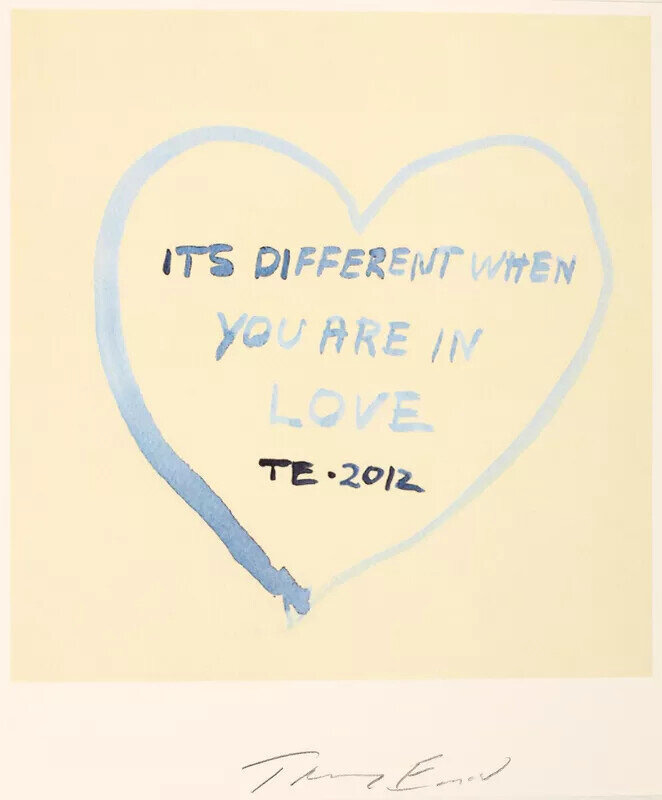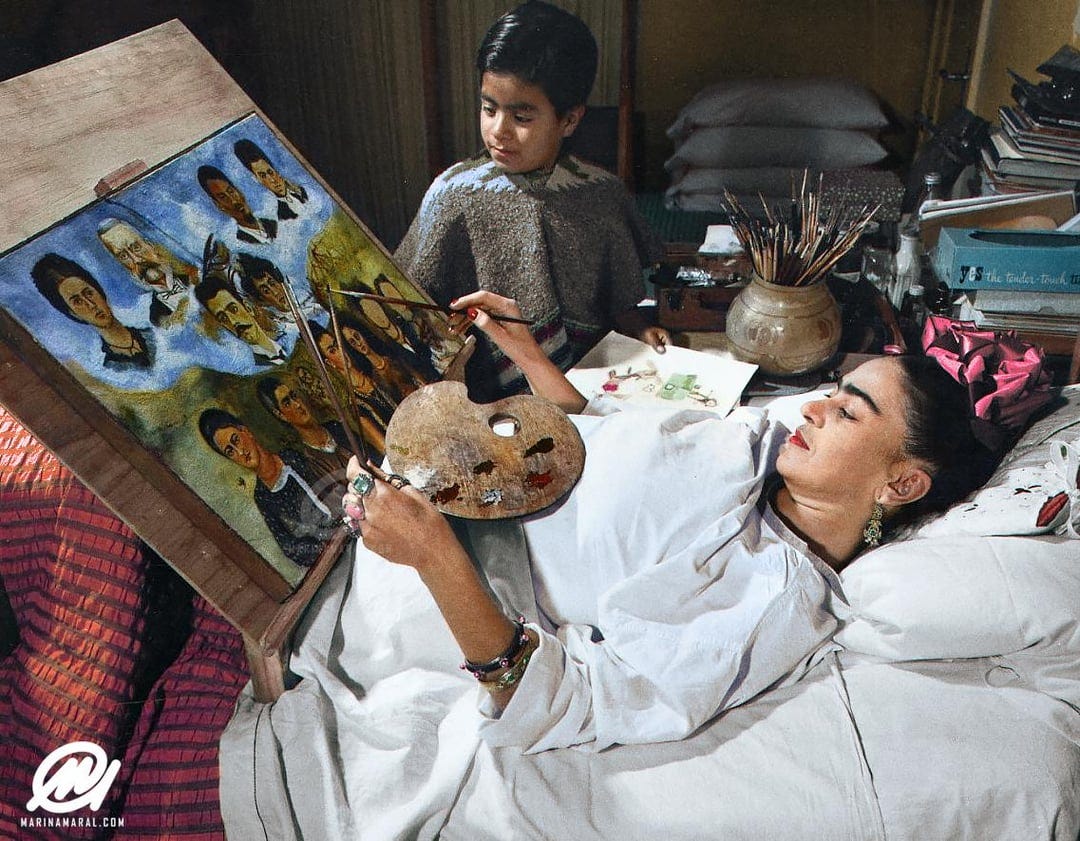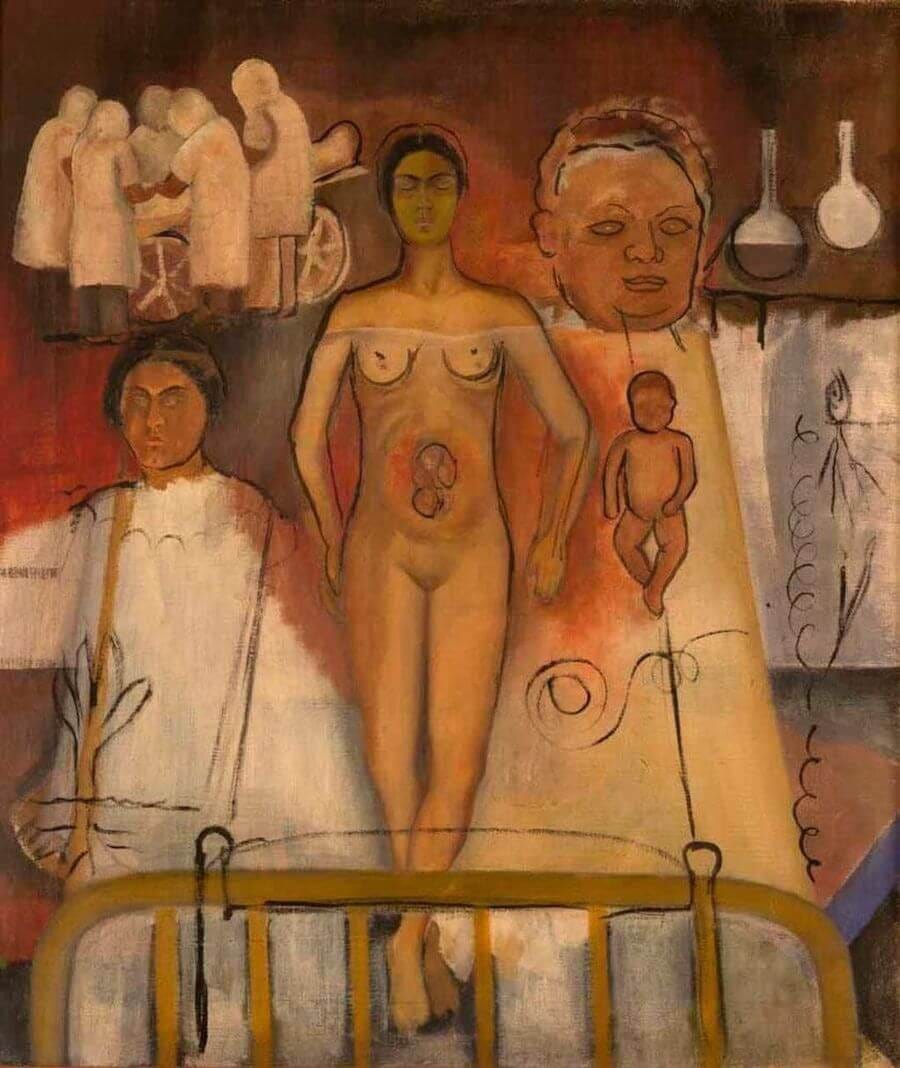THE CORRELATION BETWEEN TRACEY EMIN’S ‘HOW IT FEELS’ AND FRIDA KAHLO’S ‘HENRY FORD HOSPITAL’, IN CONTEXT OF MY FAVOURITE PJ HARVEY SONG
Frida Kahlo, diagnosed with polio age six, fully pierced with a metal bar at age sixteen. But, of course, first, and foremost a communist, brilliant artist, disappearing behind a man so big, physically and figuratively. Devoting her body and soul to him. Referencing Tracey Emin’s: ‘It’s different when you are in love.’
Frida has quietly sunken into being the face of an artist, eaten away by commerciality long after her death. Or the possibility of her profiting from her life’s work and biggest passion. God bless her soul.
Now onto the painting. I see a self-portrait. Inside and out. Frida’s unfavored surrealist spirit comes out here amazingly. Notoriously being quoted with the following: “They thought I was a Surrealist, but I wasn't. I never painted dreams. I painted my own reality.”
I see Frida lying on her back carrying a child. Being surrounded by flying objects attached to her uterus. A doctor’s model of her reproductive system, an infant, a snail, an inanimate steel object, a flower (orchid?), and finally her pelvis. There she is laying in bed, as in many of her paintings. The bed graphically says: ‘Henry Ford Hospital.’ The city of Detroit portrayed a far, mirrored on the lonesome hospital walls. Walls of sky, floors of sand, an ode to her native Mexican landscape, a bed bombastically in the middle. Beds being a common theme in her working, depicting the time she spent in bed.
Frida talks about wanting to carry Rivera’s child often. Pre-pregnancy. A dream for a woman with a shattered spine. Dreams big and shattered. Eventually, finally fallen pregnant she desired an abortion. 1932, at two months pregnant, she received some goods to try to medically induce an illegal abortion. Days later still being pregnant, maybe happily so, she decided to trust her body, spine, uterus along with her hope of having a child. Miscarrying two months later.
Being advised against an abortion is a connecting thread between both Frida as Tracey’s work. Tracey Emin recalls being ill advised considering her desired abortion, not once, but twice. Not having foreseen the mental struggle that was to come. Tracey Emin, is an English multi-disciplinary artist, once known as the enfant terrible of the 1980’s British art scene. Known for her controversial and awe-inducing work. Bending and breaking the boundaries of exhibiting. Modern art for the modern woman. When I was 19 my father randomly gave me his copy of Tracey Emin’s book Strangeland. I started reading, before actually being familiar with her work. Thus, having a very different and maybe even biased view of her body of work. So, I googled and I felt touched immediately. Not knowing why, but looking at these supposedly girly shades of pink, bleeding, and eventually, My Bed. In my strange feeling of starting young womanhood I didn’t know what was coming over me. I started crying. It felt somehow relatable, as if she was translating my classified feelings on to a canvas.
My Bed, My Bed, My Bed. As I was reading and acknowledging, in my bed. Thinking about my bed. Feeling my bed, my cotton twill sheets covering my body. Thinking about Frida’s bed, Thinking about Tracey’s bed. I couldn’t get out of my own empty bed. I despised having to get up out of my bed. Spiraling and thinking about Frida’s miscarriage, Tracey’s abortion, and my stomach aching of unfertilized eggs every month. A woman is in pain with child, without child. In want of a child. Hating children. Loving children. I felt defeated, I felt pre-emptive guilt. I quote Frida’s diary: “Quietly the grief
loudly the pain.
The accumulated poison
love faded away
Mine was a strange world
of criminal silences
of stranger’s watchful eyes
misreading the evil.
darkness in the daytime…
Was it my fault?
I admit, my great guilt
as great as pain
it was an enormous exit
which my love went through.”
Now back to my train of thought.
I see Tracey’s bed unmade, full of cigarettes, bottles & condoms. All things a teenage girl would keep hidden underneath her bed. But it all seems exposed, even perfectly so. I see a perfect bed. A statement, and most probably a shock. Why something so normal deems to be so shocking, I do not comprehend. A man’s composure is never granted, though a woman’s is a given.
How it feels. How it feels. Through Tracey’s 1996 film How It Feels, I understand how it must feel. Tracey knows how it feels. Frida knows how it feels. Frida and Tracey share the same loss and pain of having almost mothered a child. Having the experience of raising a child. Being a mother. Frida’s own decision to abort was taken away by a doctor advising her to keep the unborn child and having a cesarean. Tracey on the other hand, in her right, bravely took matters in to her own young fragile, but strong hands.
The pain translates in to both pieces in a different way, though they give me the same feeling. A feeling I personally have yet to feel.
Two women battling health issues, though advised to bare a child nevertheless.
Still thinking about Tracey’s book, and forever thinking about my experience as a young teenager finding myself in Frida, I picked up my laptop and started writing from the top of my head. Then I figured this little project I am participating in is about educating myself. I opened a tab and started off by looking for: ‘Tracey Emin Frida Kahlo’.
The first thing I saw was a picture of Tracey dressed as Frida. I felt quite stupid and immediately cursed myself for not having an original train of thought. Thereafter, I read about Tracey being compared to Frida and if she understood why. I quote Tracey Emin: “Some people say there are similarities between Frida Kahlo’s work and mine. I think it has less to do with subject matter and more about coincidences – in particular, because I am a woman.”
I am a woman. The probability of becoming a parent, a mother, is a reoccurring subject matter and even struggle pushed upon from societal pressure within everyone.
PJ Harvey is the person I have looked up to ever since I can remember. I Remember seeing an old recording of her performing on a gigantic stage, so petite, though enamoring the entire stage and even the entire crowd. That’s what I want to be like when I grow up, I thought.
I concur every room I walk into as a woman in, as, I quote an old letter by Frida Kahlo: “A man’s world.”
So, as I’m writing this, I am listening to PJ Harvey’s, ‘I Think I’m A Mother.’
You think I'll come over
I'll give you my number
You love her, support her
Then give me a mother
You come take me home and
Take me to your doctor
You think you'll come over
I think I'm a mother
Roll over, roll over
And roll me in manna
Your lover, my lover
You just roll me over
You give me a mother
And man, if I love her
I love her, I'll keep her
I'll better just keep her
"Come on and support her"
I said to the mother
She said, "You'll come over"
She said she's a voter
I love her, I kept her
And then she just left and
Alone, I implore ya
I think I'm a mother
Need you, mother
More than ever
Need you, mother
Ah, ah, ah
– Beyond White Cube: Tracey Emin on 'How It Feels', 2022
https://www.imdb.com/title/tt30319555/ - Frida, documentary, 2024
https://www.tate.org.uk/tate-etc/issue-4-summer-2005/frida-on-my-mind - Tracey Emin on Frida Kahlo
https://www.goshen.edu/academics/2010/07/28/pregnancy-loss-and-visual-expressions-of-grief-an-examination-of-frida-kahlo/ - Frida Kahlo on grief and loss






